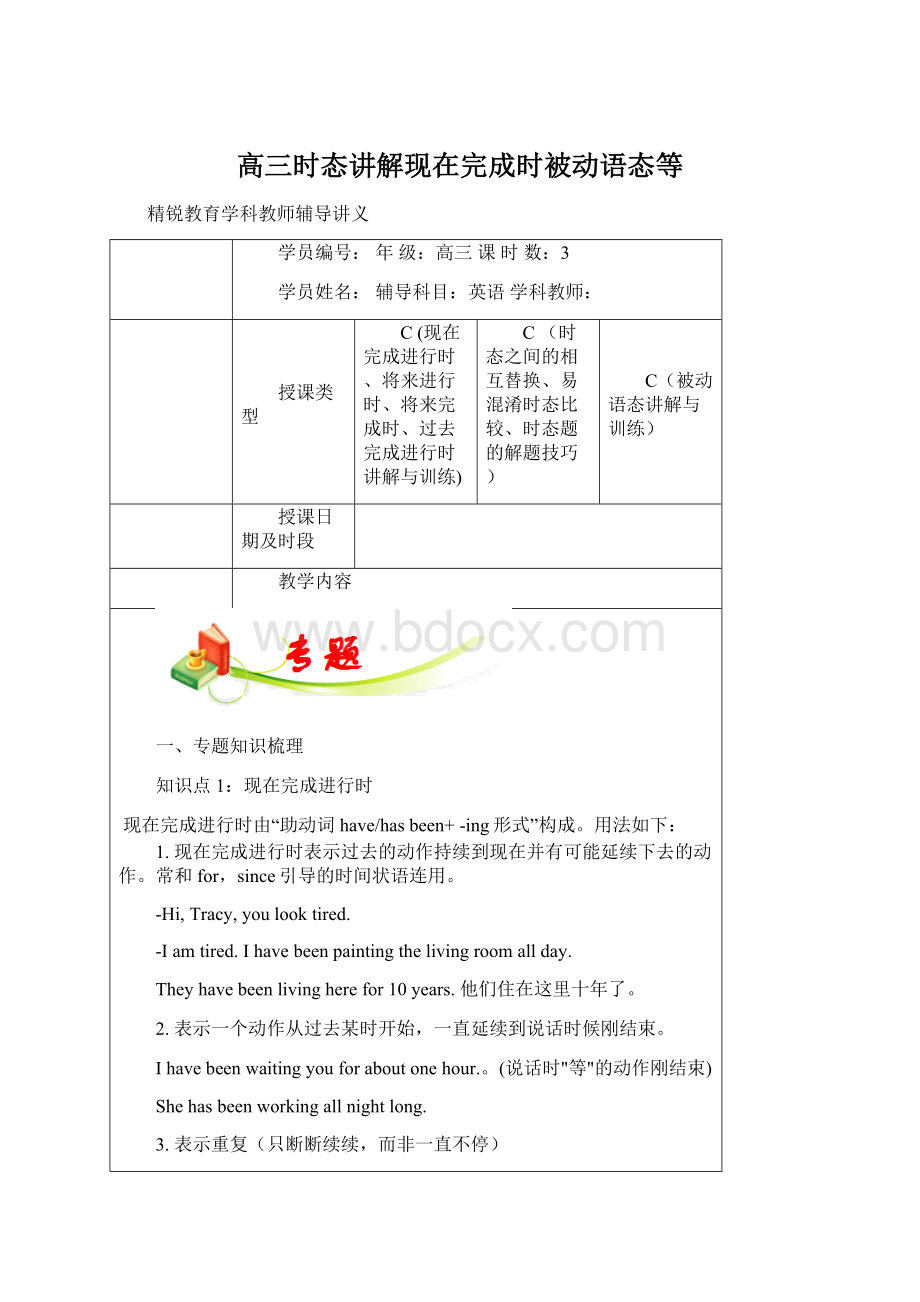高三时态讲解现在完成时被动语态等.docx
《高三时态讲解现在完成时被动语态等.docx》由会员分享,可在线阅读,更多相关《高三时态讲解现在完成时被动语态等.docx(27页珍藏版)》请在冰豆网上搜索。

高三时态讲解现在完成时被动语态等
精锐教育学科教师辅导讲义
学员编号:
年级:
高三课时数:
3
学员姓名:
辅导科目:
英语学科教师:
授课类型
C(现在完成进行时、将来进行时、将来完成时、过去完成进行时讲解与训练)
C(时态之间的相互替换、易混淆时态比较、时态题的解题技巧)
C(被动语态讲解与训练)
授课日期及时段
教学内容
一、专题知识梳理
知识点1:
现在完成进行时
现在完成进行时由“助动词have/hasbeen+-ing形式”构成。
用法如下:
1.现在完成进行时表示过去的动作持续到现在并有可能延续下去的动作。
常和for,since引导的时间状语连用。
-Hi,Tracy,youlooktired.
-Iamtired.Ihavebeenpaintingthelivingroomallday.
Theyhavebeenlivingherefor10years.他们住在这里十年了。
2.表示一个动作从过去某时开始,一直延续到说话时候刚结束。
Ihavebeenwaitingyouforaboutonehour.。
(说话时"等"的动作刚结束)
Shehasbeenworkingallnightlong.
3.表示重复(只断断续续,而非一直不停)
We’vebeendiscussingthematterseveraltimesthisyear.
Ihavebeensayinggoodbyetosomefriendstoday.
知识点2:
将来进行时
将来进行时由“助动词shall/will+be+v-ing”构成,用法如下:
1.表示将来某一时刻或某段时间正在发生的动作,常与thistimetomorrow,at4o’clocktomorrowafternoon等时间状语连用。
I'llbevisitingprofessorLiat2thisafternoon.
Atthistimetomorrowwe’llbeflyingovertheAtlantic.
2.表示一种已经决定或肯定的动作或情况,或表示某动作将在按计划发生而未完成。
Weshallbehavingameetinginaminute.
WillyoubeseeingMr.Wangthisevening?
知识点3:
将来完成时
将来完成时表示将来某一时间之前已经完成的动作。
将来完成时由“shall/will+have+v-ed”构成。
用法如下:
1.将来完成时表示将来某一时间或动作发生之前已经完成的动作,通常与before或by连用。
Beforelong,hewillhaveforgottenallaboutit.
Bytheendofthismonth,we'llhavestudied10units.
2.表示持续到将来某一时间的动作或状态,这动作或状态也可能将继续进行下去。
Whentheymoveherenextmonth,we'llhavelivedinthecityfor5years.
Bytheendofthismonthweshallhavebeenherefortwoyears.
3.表示对现在或将来可能完成动作的推测
Shewillhavearrivedbynow.
Itisseven.Hewillhavegotup.
知识点4:
过去完成进行时
过去完成进行时主要表示过去某一时间以前一直在进行的动作。
过去完成进行时由“助动词had+been+v-ing”构成。
1.过去完成进行时表示动作在过去某一时间之前开始并延续到过去这一时间。
这一动作可能己经停止也可能还在进行。
ShetoldmethatshehadbeenstudyingFrenchfor5years.(仍继续)
Shetoldmethatshehadbeenwaitingformeforanhour.(不再继续)
HehadbeenstudyingEnglishbeforeenteringthecollege.
2.表示反复的动作、企图、情绪、最近的情况
Youhadbeengivingmeeverything.(感激)
Ihadbeenstudyingthemeaningofthepoem.我一直在研究这首诗。
(我还没懂)
二、专题精讲
例题1:
1.He__________Englishforeightyearsbythetimehegraduatesfromtheuniversitynextyear.
A.willgraduateB.willhavegraduated
C.graduatesD.istograduate
【答案】B
【解析】据句意:
到她明年大学毕业为止,她学英语有八年了。
表示到过去某一时间将要完成的动作。
例题2:
Nowthatsheisoutofajob,Lucy____goingbacktoschool,butshehasn’tdecidedyet.
A.hadconsideredB.hasbeenconsideringC.consideredD.isgoingtoconsider
【答案】B
【解析】该题是在交际情境中考查动词时态的用法。
根据句意应选完成进行时,表示过去的动作(考虑返校学习)持续到现在(还没有决定)今后还有可能进行的动作。
句意:
既然露西失业了,她一直在考虑返校读书,但她还没有定下来。
例题3:
Atthistimetomorrow_____overtheAtlantic.
A.we’regoingtoflyB.we’llbeflyingC.we’llflyD.we’retofly
【答案】B
【解析】该题考查动词时态的用法。
该题的关键在于Atthistimetomorrow,这是典型的将来进行时的时间状语,将来进行时是表示将来某个时刻正在进行或持续的动作。
题意:
明天此时我们正在飞越大西洋的上空。
例题4:
--Hi,Tracy,youlooktired.
--Iamtired.I_____thelivingroomallday.
A.paintedB.hadpaintedC.havebeenpaintingD.havepainted
【答案】C
【解析】该题考查动词时态的用法。
Tracy显得疲惫是因为她全天(allday)一直在粉刷房间。
粉刷房间这一动作从早上开始一直在进行,可能还要进行下去。
也可能刚刚停止,所以本题用现在完成进行时。
句意:
“你好,Tracy!
你看上去很疲劳。
”“全天我一直在刷房子。
”
三、专题过关
检测题1
单项选择:
1.---Comeonin,Peter.Iwanttoshowyousomething.
---Oh,howniceofyou!
I______you______tobringmeagift.
A.neverthink;aregoingB.neverthought;weregoingC.didn’tthink;weregoingD.hadn’tthought;weregoing
2.--Wecouldhavewalkedtothestation;itwassonear.---Yes.Ataxi______atallnecessary.
A.wasn'tB.hadn'tbeenC.wouldn'tbeD.won'tbe
3..Wewereallsurprisedwhenhemadeitclearthathe___officesoon.
A.leavesB.wouldleaveC.leftD.hadleft
4.---Alice,whydidn'tyoucomeyesterday?
---I_______,butIhadanunexpectedvisitor.
A.hadB.wouldC.wasgoingtoD.did
5.---Isthereanythingwrong,Bob?
Youlooksad.---Oh,nothingmuch.Infact,I_____ofmyfriendsbackhome.
A.havejustthoughtB.wasjustthinkingC.wouldjustthinkD.willjustbethinking
6.---Tom,youdidn’tcometothepartylastnight.---I_____,butIsuddenlyrememberIhadhomeworktodo.
A.hadtoB.didn’tC.wasgoingtoD.wouldn’t
7.Inaroomabovethestorewhereaparty_______,someworkerswerebusilysettingthetable.
A.wastobeheldB.hasbeenheldC.willbeheldD.isbeingheld
8.I_____alongthestreetlookingforaplacetoparkwhentheaccident_______.
A.went;wasoccurringB.went;occurredC.wasgoing;occurredD.wasgoing;hadoccurred
9.---HasyourfatherreturnedfromAfricayet?
---Yes,buthe_________hereforonlythreedaysbeforehiscompanysenthimtoAustralia.
A.wasB.hasbeenC.willbeD.wouldbe
10.---Ringmeatsevena.m.?
---No,notthatearly!
I________.
A.sleepB.willsleepC.amsleepingD.willbesleeping
11.Youknow,I______lookingforajobforthreemonths,andthisismyfirstinterview.
A.amB.wasC.willbeD.havebeen
12.You’dbetternotphonethemanagerbetween7and8tomorrowevening;he______animportantmeetingthen.
A.willhaveB.wouldhaveC.willbehavingD.willhavehad
13.---Doyouhaveanyproblemifyou_______thisjob?
---Well,Iamthinkingaboutthesalary.
A.offerB.willofferC.areofferedD.willbeoffered
14.Myuncle_________untilhewasforty-five.
A.marriedB.didn’tmarryC.wasnotmarryingD.wouldn’tmarry
15.---HaveyouknownDr.Jacksonforalongtime?
---Yes,sinceshe______theChineseSociety.
A.hasjoinedB.joinsC.hadjoinedD.joined
1----5BABCB6----10CACAD11----15DCCBD
检测题2
动词适当形式填空:
1.He__________(lie)ononeofthesunnybeachesinHawaiialldaywhenhespendshisholidaythere.
2.Don’tcallmebetween2:
00and4:
00thisafternoon.I________(have)atestthen.
3.Nobodyknewwhat________(happen)totheEarthinacentury’stime.
4.Mr.LeesaidhewouldgivetheCDtomeassoonashe______(return)fromCanada.
5.Whenwewereyoung,father________(take)usforaspecialtreatonMother’sday.
6.----DidyouinviteSarahtoyourbirthdayparty?
----Sorry,Iforget.I_______(call)hernow.
7.Youhavetoputinmoreeffortifyouwere_________(pass)thetest.
8.I__________(tell)youaboutmyplan,butyoustoppedmebeforeIcouldspeak.
9.Willyou__________(use)yourcomputerthistimetomorrow?
10.I__________(close)thekitchendoorwhenalittlemousepoppeditsheadout.
willbelying,will/shallbehaving,wouldhappen,returned,wouldtake,willcall,topass,wasabouttotell,beusing,wasabouttoclose
四、学法提炼
一般现在时:
主要考察用在从句中表将来的用法,另外,在解题中要注意‘先语态后时态’的原则。
一般过去时:
主要考察无时间状语时态句,需要充分利用题中所给信息结合语境解题。
一般将来时:
主要考察不同将来时表达法的应用,注意根据语境解题;另外,需要注意will表意愿的特殊用法。
一、专题知识梳理
知识点1:
时态之间的相互替换
1.一般现在时代替一般将来时
When,while,before,after,till,once,assoonas,solongas,bythetime,if,incase(that),unless,evenif,whether,themoment,theminute,theday,theyear,immediately等引导的时间状语从句,条件句中,用一般现在时代替将来时。
HeisgoingtovisitherauntthedayhearrivesinBeijing.
2.一般现在时代替一般过去时
(1)"书上说","报纸上说"等。
例如:
Thenewspapersaysthatit'sgoingtobecoldtomorrow.
(2)叙述往事,使其生动。
例如:
Napoleon'sarmynowadvancesandthegreatbattlebegins.
3.一般现在时代替现在完成时
(1)有些动词用一般现在时代替完成时,如hear,tell,learn,write,understand,forget,know,find,say,remember等。
例如:
Ihear(=haveheard)hewillgotoLondon.
Iforget(=haveforgotten)howoldheis.
2)用句型"Itis…since…"代替"Ithasbeen…since…"。
例如:
Itis(=hasbeen)fiveyearssincewelastmet.从我们上次见面以来,五年过去了。
4.一般现在时代替现在进行时。
在Herecomes…/Theregoes…等句型里,用一般现在时代替现在进行时。
例如:
Theregoesthebell.铃响了。
5.现在进行时代替将来时
(1)表示即将发生的或预定中计划好的活动。
例如:
Areyoustayingwithusthisweekend?
和我们一起度周末好吗?
Weareleavingsoon. 我们马上就走。
(2)渐变动词,如get,run,grow,become,begin以及瞬间动词die等。
例如:
Heisdying.他要死了
知识点2:
易混淆时态比较
1.一般过去时和现在完成时
现在完成时与一般过去时都表示完成的动作,但现在完成时强调这一动作对现在造成的影响或结果,强调的是现在的情况,所以它不能和表示过去的时间状语连用,如yesterday,lastnight,threeweeksago,in1990等。
而一般过去时则表示过去的动作或状态,和现在不发生关系,它可以和表示过去的时间状语连用。
Ihaveseenthefilm.(我了解这部电影的内容)
Isawthefilmlastweek.(只说明上星期看了这个电影,不涉及现在的情况)
2.现在完成时与现在完成进行时的比较
(1)现在完成时表示到现在为止已经完成,或者在过去曾经发生过的动作;现在完成时往往表示仍将继续下去的动作。
Ihavewrittenanarticle.(已完成)
Ihavebeenwritinganarticle.(还在写)
(2)当现在完成进行时表示刚刚结束时,现在完成时强调动作的结果,现在完成进行时则强调动作在不久以前持续进行的情景,并带有感色彩。
Nowwehavecleanedtheroom;wecanmovethethingsin.(强调打扫完了的结果)
—Youlooksotired.Whathaveyoubeendoing?
—I'vebeenplayingfootball.(强调不久前踢球的情景)
知识点3:
确定时态的技巧
1.从句子本身附带的时间状语来确定时态。
时态与时间状语一般遵循以下几条原则:
(1)句中若有everyday,everyFridayafternoon,twiceaweek,often,always,usually等类似的时间状语时,句子多用一般现在时。
TheyusuallywatchTVintheevening.
MissGaostudiesEnglishontheradioeverymorning.
(2)句中若有yesterday,lastmonth,in1998,twoyearsago,beforeliberation等类似的时间状语时,句子多用一般过去时。
Itoldhertobringmybooktoschoolyesterday.
Mysisterfinishedmiddleschoolhalfayearago.
(3)句中若有tomorrow,nextweek,whenspringcomes,ifwehavetime等类似的时间状语(或从句)时,句子(或主句)多用一般将来时。
Ifitdoesn’traintomorrow,weshallvisittheGreatWall.
Therewillbeafilminourschooltomorrowevening.
(4)句中若有fortwoyears,in(during)thepast(last)tenyears,since1990(一般过去时从句),already,just,yet,uptonow,untilnow等类似的时间状语(或从句)时,句子(或主句)多用现在完成时。
ZhaoLanhasalreadystudiedinthisschoolfortwoyears.
Thetwooldmenhaven’tseeneachothersince1970.
(5)句中若有attenlastnight,thewholeevening,thistimeyesterday,whenhecamein等类似的时间状语(或从句)时,10句子(或主句)多用过去进行时。
Theywerehavingameetingattenyesterdaymorning.
Weweretalkingaboutthefilmwhenhecamein.
(6)句中若有by1999,bytheend(time)oflastterm,twoweeksbefore,beforehecamehere等类似的时间状语(或从句)时,句子(或主句)多用过去完成时。
Bytheendofthematch,theyhadkickedfourgoals.
HehadlearnttwothousandChinesewordsbeforehecametotheschool.
(7)句中若有时间状语now或提示词Look!
Listen!
Bequiet!
Hurry!
等时